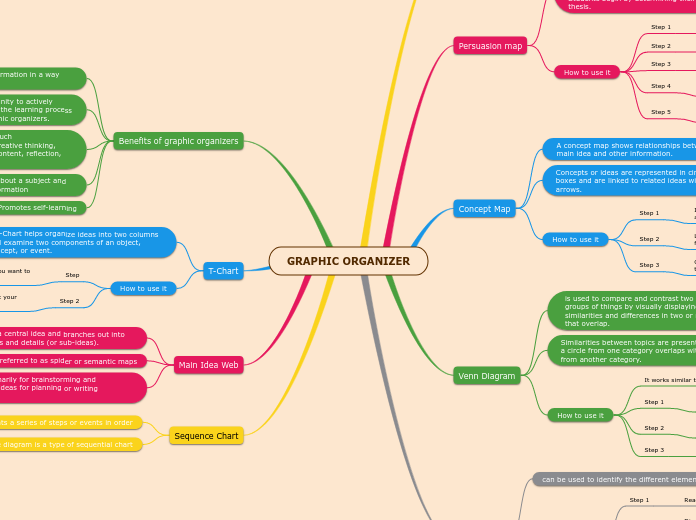GRAPHIC ORGANIZER
are visual and graphic displays that organize ideas and demonstrate relationships between different information and concepts.
Persuasion map
The Persuasion Map is an interactive graphic organizer that enables students to map out their arguments for a persuasive essay or debate. Students begin by determining their goal or thesis.
How to use it
Step 1
Choose a topic of interest for your essay/debate.
Step 2
Define the claim that you want to make with your essay
Step 3
Next to it, write down the reasons for making that claim.
Step 4
Then write down facts, examples, and information to back up your reasoning.
Step 5
End your persuasion map with the conclusion of your essay.
Concept Map
A concept map shows relationships between the main idea and other information.
Concepts or ideas are represented in circles or boxes and are linked to related ideas with arrows.
How to use it
Step 1
Identify the most important element under the topic you are studying.
Step 2
List down the second layer of sub-elements stemming from the first component you have identified.
Step 3
Connect these with lines to show how they are connected to each other.
Venn Diagram
is used to compare and contrast two or more groups of things by visually displaying their similarities and differences in two or more circles that overlap.
Similarities between topics are presented where a circle from one category overlaps with a circle from another category.
How to use it
It works similar to the double bubble map.
Step 1
Write down the topics being compared on the top of each circle.
Step 2
Write down the differences or unique characteristics inside its own sector avoiding the overlapping area.
Step 3
List the similarities in the common area.
Story map
can be used to identify the different elements
characters, character plots, themes, techniques, etc.
How to use it
Step 1
Read the book and understand it well.
Step 2
Discuss the different significant elements that were involved in the story.
These could be the characters, setting, problem and solution, etc.
You can fill the story map during the discussion
Step 3
Once the map is complete you can discuss each element individually.
Benefits of graphic organizers
Help visualize or present information in a way that is easier to comprehend
Provide students the opportunity to actively contribute and participate in the learning process through the creation of graphic organizers.
Help develop cognitive skills such asbrainstorming, critical andcreative thinking, categorizing and prioritizing content, reflection, etc.
Help recall prior knowledge about a subject and quickly connect it to new information
Promotes self-learning
T-Chart
A T-Chart helps organize ideas into two columns and examine two components of an object, concept, or event.
How to use it
Step
Draw a T chart and write down the two areas you want to brainstorm around on each column head.
Step 2
Write down facts on each column as you carry out your brainstorming.
Main Idea Web
starts with a central idea and branches out into related ideas and details (or sub-ideas).
referred to as spider or semantic maps
is used primarily for brainstorming and generating ideas for planning or writing purposes.
Sequence Chart
presents a series of steps or events in order
A cycle diagram is a type of sequential chart
represent a sequence of stages, tasks, or events in a circular flow.
